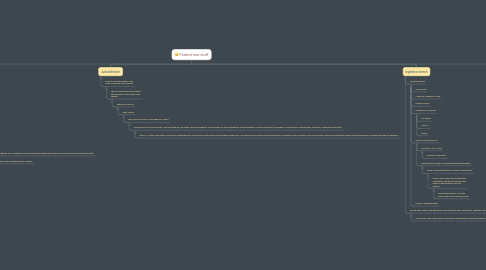
1. legislative branch
1.1. The requirements
1.1.1. 25 years old
1.1.2. 7 years as a resident in state
1.1.3. Current number
1.1.4. Chambers of Congress
1.1.4.1. 100 senate
1.1.4.2. 435 h.o.r
1.1.4.3. Senate
1.1.5. Terms for senate and h.o.r
1.1.5.1. For the h.o.r it is 2 years
1.1.5.1.1. Senate is 6 year terms.
1.1.5.2. Implied/elastic clause and expressed/enumerated power
1.1.5.2.1. Implied ,Regulate interstate commerce. Declare war.
1.1.6. House of Representatives
1.2. Among other powers, the legislative branch makes all laws, declares war, regulates interstate and foreign commerce and controls taxing and spending policies.
1.2.1. Article One of the United States Constitution establishes the legislative branch of the federal government, the United States Congress. Under Article One, Congress is a bicameral legislature consisting of the House of Representatives and the Senate.
2. Judicial branch
2.1. There are no qualifications to be come a Supreme Court member
2.1.1. They are selected by the president and approved by the United state senates.
2.1.1.1. There are 9 justices
2.1.1.1.1. Chief Justice
3. Executive branch
3.1. Qualifications for president and vice
3.1.1. candidate must be a natural born citizen of the United States, a resident for 14 years, and 35 years of age or older.
3.1.1.1. President can sever 2 terms of 4 years of each terms and can only serve twice
3.1.1.1.1. Powers are Being able to veto, or reject, a proposal for a law. Appoint federal posts, such as members of government agencies. Negotiate foreign treaties with other countries. Appoint federal judges. Grant pardons, or forgiveness, for a crime.
4. 10 Amendments
4.1. The First Amendment provides several rights protections: to express ideas through speech and the press, to assemble or gather with a group to protest or for other reasons, and to ask the government to fix problems. It also protects the right to religious beliefs and practices. It prevents the government from creating or favoring a religion.
4.1.1. The Second Amendment protects the right to keep and bear arms.
4.1.1.1. The Third Amendment prevents government from forcing homeowners to allow soldiers to use their homes. Before the Revolutionary War, laws gave British soldiers the right to take over private homes.
4.1.2. The Fourth Amendment bars the government from unreasonable search and seizure of an individual or their private property.
4.1.2.1. The Fifth Amendment provides several protections for people accused of crimes. It states that serious criminal charges must be started by a grand jury. A person cannot be tried twice for the same offense (double jeopardy) or have property taken away without just compensation. People have the right against self-incrimination and cannot be imprisoned without due process of law (fair procedures and trials.)
4.1.2.1.1. The Sixth Amendment provides additional protections to people accused of crimes, such as the right to a speedy and public trial, trial by an impartial jury in criminal cases, and to be informed of criminal charges. Witnesses must face the accused, and the accused is allowed his or her own witnesses and to be represented by a lawyer.

